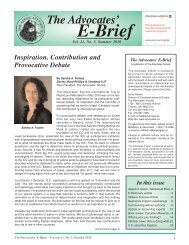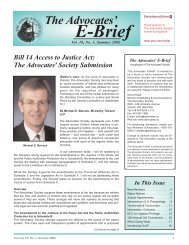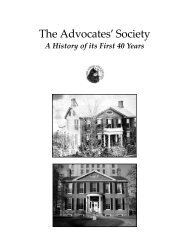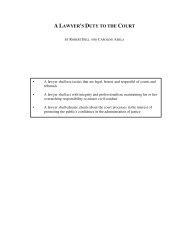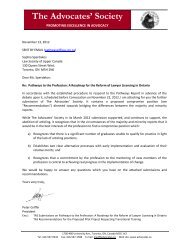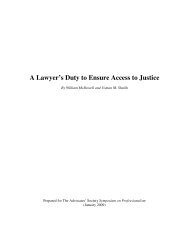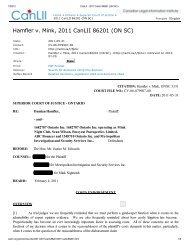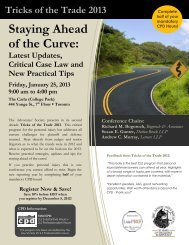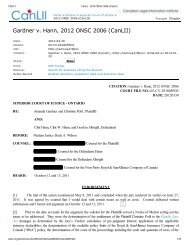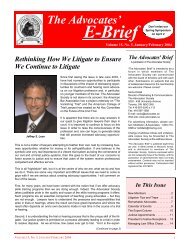Litigation Process a.. - The Advocates' Society
Litigation Process a.. - The Advocates' Society
Litigation Process a.. - The Advocates' Society
Create successful ePaper yourself
Turn your PDF publications into a flip-book with our unique Google optimized e-Paper software.
- 10 -<br />
Although the independence, integrity and strength of the expert’s<br />
opinion is critical, the value of the opinion is diminished if it cannot<br />
be effectively communicated to the fact-finder at trial”. 23<br />
<strong>The</strong> issue upon which experts are retained to opine are usually complex and often times<br />
technical. It is advisable to remind your expert that the concepts and terminology that are<br />
familiar to him will not be familiar to the trier of fact, and it is best to use plain language and<br />
break down complex and technical concepts into simplified parts.<br />
When preparing an expert for trial, work with the expert to ensure that her testimony is<br />
presented in a sequence with which he or she feels most comfortable. Doing so helps to ensure<br />
that the expert does not become flustered or forget an important point. Although counsel is likely<br />
to catch any missed points, it is often most effective when the information appears to come<br />
naturally as opposed to being coaxed by counsel. Moreover, as with any other witness, the<br />
testimony of the expert will appear more confident if the expert is in his ‘comfort zone’ and this<br />
will affect how credible the expert is perceived to be. During pre-trial preparation of the expert,<br />
ensure that any weaknesses in the expert’s opinion are put to him so that he will not be taken by<br />
surprise by opposing counsel once he is ‘in the box’.<br />
Some tips to ensure that your expert is able to effectively communicate his opinion to the<br />
fact-finder include:<br />
• ensuring that the expert makes eye contact with the trier of fact<br />
rather than the lawyer when giving evidence;<br />
• instructing the expert to use clear, concise and plain language<br />
when discussing complex and technical concepts;<br />
• avoid jargon familiar to the expert and his or her peers but not to the<br />
Court<br />
• having the expert give viva voce evidence in a conversational<br />
manner;<br />
23 Ibid [Seckinger] at 39.<br />
© 2012 <strong>The</strong> Advocates’ <strong>Society</strong>. <strong>The</strong>se materials may not be reproduced, published, distributed<br />
or posted on-line without the written permission of <strong>The</strong> <strong>Advocates'</strong> <strong>Society</strong>.



